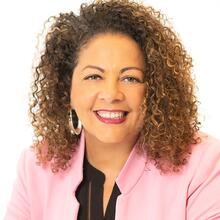Like many first-generation Canadians, Jaqui Parchment (BMath’87) and her parents struggled financially when they moved here from Jamaica. “My parents couldn’t find work in their field, so we took a big step backwards economically,” she shared.
Determined to forge a successful path, Parchment enrolled in the actuarial science program at Waterloo’s Faculty of Mathematics. As one of the only Black women in her program, there were times when Parchment felt like a “fish out of water,” she remembered. “The great thing about Waterloo, though, was that, in a way, most students felt like fish out of water in our society because they were such an intelligent, nerdy group.”
While she felt intimidated at times, Parchment looks back with gratitude at the opportunity to build close relationships with like-minded peers. “More than 30 years after graduating, the people I met at Waterloo are still my best friends,” she expressed. “My Waterloo education was rigorous; it pushed me out into the world with intellectual strength. Just as importantly, it taught me the value of building a team of people who will cheer you on through thick and thin.”
Parchment relied on her team of cheerleaders for support and counsel as she changed career direction halfway through taking her actuarial exams. “I felt pressured to emerge with a degree that would lead to success, but I soon discovered that I didn’t like or excel at the technical work,” she said. “What I was really great at was conveying complex information to clients in a way that was meaningful to them.”
 Parchment spent the first decade of her career making lateral moves. At Mercer Canada, a global leader in human resources consulting, she moved vertically until she reached the top. After 20 years of leading investment teams at Mercer Canada, she became CEO of the company in 2018. Today, she leads 1,100 employees across the country.
Parchment spent the first decade of her career making lateral moves. At Mercer Canada, a global leader in human resources consulting, she moved vertically until she reached the top. After 20 years of leading investment teams at Mercer Canada, she became CEO of the company in 2018. Today, she leads 1,100 employees across the country.
“I would have told you with great conviction I never wanted to lead an organization of this size,” she admitted. “As a member of an underrepresented group, it doesn’t feel logical to go for leadership positions when you don’t see anyone in these roles who looks like you.” More than once, she turned down a promotion, only accepting the job once it became evident she was the only one around who was qualified to fill it. “I was fortunate to have some very good mentors who pushed me to do more than I thought I could do,” she remembered, “and eventually, I developed the muscle to really believe in myself.”
Now that she has climbed to the top of the ladder, Parchment invests her time and passion into empowering others to join her there. “I talk a lot about the professional journey of women and the ways they view opportunities differently than men,” shared Parchment. She points to research that reveals how women are significantly more likely to underestimate their qualifications for a new position. “I can’t tell you how often I pick up the phone and ask someone why she hasn’t applied for a higher-level role.”
When Parchment advises job seekers on what to look for in a workplace, she tells them to seek an environment where they can bring their “whole selves” to work. “It’s important to look around and see people who look like you at different levels of leadership,” she explained. Mercer Canada has plenty of room to improve, she acknowledged, but the company is making strides toward greater diversity, equity, and inclusion every year. Currently, Parchment’s leadership team is more than 50 percent women.
Over the years, Parchment has supported Mercer’s global When Women Thrive research in diversity, equity and inclusion (DEI), and played a central role in helping develop, retain, and advance female talent through internal groups like Women@Mercer. As a proud alumna of Waterloo, she wholeheartedly supports similar initiatives like the Waterloo Women’s Impact Network (WWIN).
“I admire the WWIN for playing such a critical role in enabling women in mathematics and computer science to recognize their boundless potential,” Parchment reflected. “When we bring diverse perspectives together to mentor and empower young women, it benefits not just the individual but the community as a whole. As women in leadership, it’s our responsibility to lift the next generation higher.”





